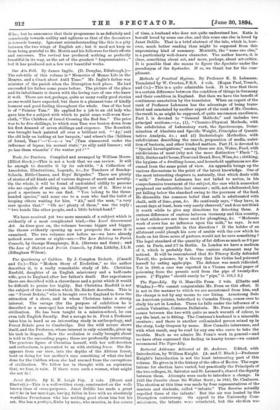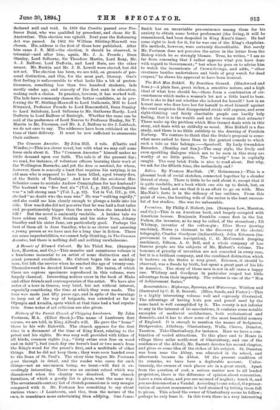Rectorial Addresses delivered at St. Andrews. Edited, with Introduction, by
William Knight. (A. and C. Black.)—Professor Knight's Introduction is not the least interesting part of this volume. He gives in it the history of the office of Rector. The regu- lations for election have varied, but practically the Principals of the two colleges, St. Salvator and St. Leonard's, shared the dignity between them. Attempts were made to introduce a change. In 1825 the Comitia chose Sir Walter Scott ; in 1843, Dr. Chalmers. The election at this time was made by four representatives of the masters and students, called " infants." The Senatus actually expelled three of the infants ! But the air was heated by the Disruption controversy. On appeal to the University Com- missioners, the infants wera reinstated, but the election was declared null and void. In 1858 the Comitia passed over Pro- fessor Buist, who was qualified by precedent, and chose Sir R. Anstruther. This election was upheld. Next year the Reforming Act was passed. In 1862 Sir William Stirling-Maxwell was chosen. His,address is the first of those here published. After him came J. S. Mill—the election, it should be observed, is triennial—and after him, again, Mr. J. A. Fronde ; Dean Stanley, Lord Selborne, Sir Theodore Martin, Lord Reay, Mr. A. J. Balfour, Lord Dufferin, and Lord Bute, are the other names. Mr. Ruskin and Mr. J. R. Lowell were elected, but did not act. The election has been, we are told, on grounds of per- sonal distinction, and this, for the most part, literary. One's first feeling is unfavourable to what looks like a bit of preten- tiousness, something less than two hundred students, lads mostly under age, and scarcely of the first rank in education, making such a choice. In practice, however, it has worked well. The lads have commonly chosen the better candidate, as in pre- ferring Sir W. Stirling-Maxwell to Lord Dalhousie, Mill to Lord Kinnaird, Professor Froude to Lord Beaconsfield, Dean Stanley to Lord Salisbury, Lord Selborne to Mr. Gathorne Hardy, Lord Dufferin to Lord Balfour of Burleigh. Whether the same can be said of the preference of Lord Neaves to Professor Huxley, Sir T. Martin to Mr. Freeman, and Mr. A. J. Balfour to Sir J. Lubbock, we do not care to say. The addresses have been criticised at the time of their delivery. It must be now sufficient to enumerate their authors.



















































 Previous page
Previous page